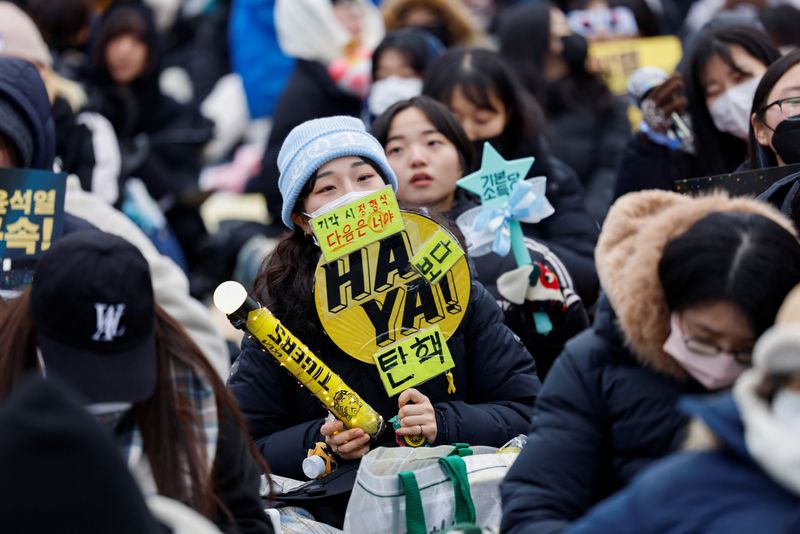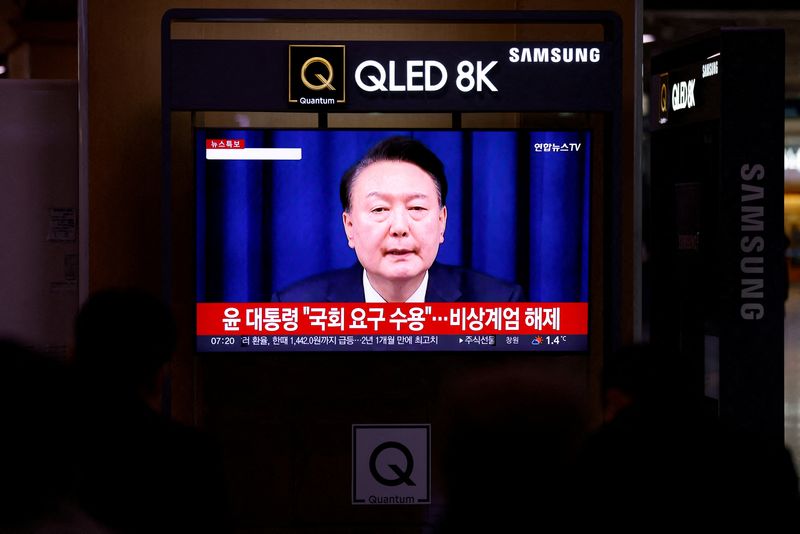By Joyce Lee
SEOUL (Reuters) -South Korea's Constitutional Court will hold its first hearing on Friday in the case of President Yoon Suk Yeol, after parliament impeached him over his short-lived martial law decree on Dec. 3.
Here are key issues for South Korea's road ahead.
WHAT NEXT?
After being impeached on Dec. 14, Yoon's presidential powers are suspended but he remains in office, retaining his immunity from most charges except for insurrection or treason. Yoon-appointed Prime Minister Han Duck-soo is acting president.
The Constitutional Court must decide within 180 days whether to remove Yoon from office or reject the impeachment and restore his powers. If the court removes Yoon or he resigns, a presidential election must be held within 60 days.
The court is due to hold its first preparatory hearing on Friday.
Opposition Democratic Party lawmaker Jung Chung-rae, the head of parliament's Legislation and Judiciary Committee, is leading the case for removing Yoon.
Yoon's legal counsel has not yet been announced, but his background as a prosecutor has sparked reports that he is turning to former colleagues or could even represent himself.
Kim Hong-il, a former prosecutor and former head of the broadcasting regulator under Yoon, as well as former Constitutional Court spokesperson Bae Bo-yoon, are expected to join Yoon's legal teams in the impeachment review and in criminal investigations, local media has reported.
IMPEDIMENTS TO A COURT RULING?
Under South Korea's constitution, six justices must agree in order to oust an impeached president. The nine-member Constitutional Court now has three vacancies, so the current justices would have to vote unanimously to remove Yoon.
The Constitutional Court has said that it can deliberate and hear arguments with just six justices.
The three vacancies are allotted for parliament to fill. The main opposition Democratic Party, which has a majority in parliament, is seeking to fill the vacancies.
Parliament held hearings for all three potential nominees this week, which the ruling People Power Party boycotted, saying that acting president Han does not have the right to appoint Constitutional Court justices.
There is precedent for an acting president appointing a Constitutional Court justice, as occurred when former President Park Geun-hye was impeached in 2016-2017.
WHAT HAPPENS IN COURT?
In South Korea's only previous presidential removal by impeachment, the court took three months to oust Park in 2017.
This time, the terms of two court justices expire in April, and legal experts predict the court may seek to rule before then to minimise uncertainty.
In the past, academics say, Constitutional Court justices have not voted predictably by political leaning but have decided case by case, based on their interpretation of the constitution.
Conservative attempts to rally popular support for Yoon are not expected to affect the court's ruling, as Park was removed from office despite continued conservative rallies to keep her in power, warring with candlelight rallies to remove her from power.
In the case of Park, who like Yoon was from a centre-right party, the court voted unanimously to remove her, including some justices viewed as conservative and two Park appointees.
Yoon also faces criminal investigations related to the martial law decision.
If charged, he could ask the Constitutional Court to suspend the 180-day clock on the impeachment ruling. The court denied a similar request in Park's case.

In 2004, then-President Roh Moo-hyun, from a centre-left party, was impeached on the charge of failing to maintain political neutrality as required of a high public official.
The court rejected the motion after about two months, and Roh fulfilled his five-year term.
